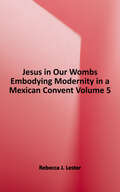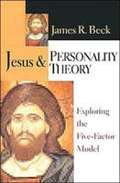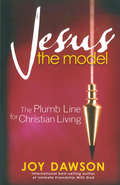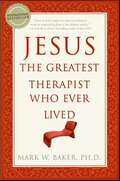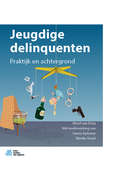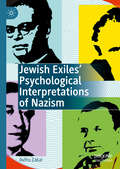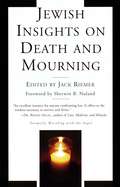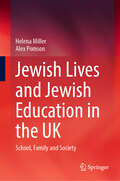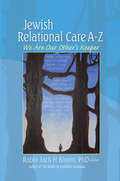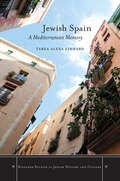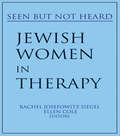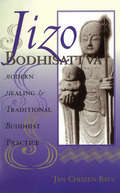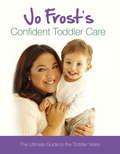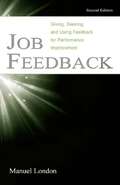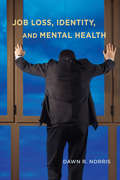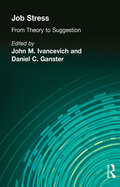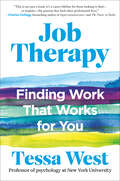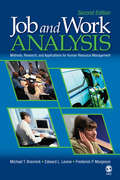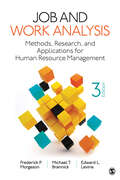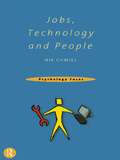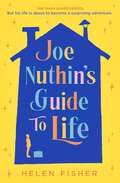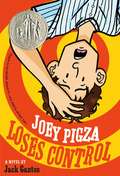- Table View
- List View
Jesus In Our Wombs: Embodying Modernity in a Mexican Convent (Ethnographic Studies In Subjectivity Ser. #5)
by Rebecca J. LesterThis book takes us behind the walls of a Roman Catholic convent in central Mexico to explore the lives, training, and experiences of a group of postulants - young women in the first stage of religious training as nuns. This book considers how these aspiring nuns learn to experience God by cultivating an altered experience of their female bodies.
Jesus and Personality Theory: Exploring the Five-Factor Model
by James R. BeckIn recent years researchers in human personality have come to a rarely achieved near unanimous conclusion: human personality is structured around a very few major traits, probably five in number. These factors, sometimes called the Big Five and represented by the acronym OCEAN, are Openness to experience -- Conscientiousness -- Extroversion -- Agreeableness --Neuroticism. How does this Five-Factor Model fit with a Christian understanding of human nature? How does it compare or contrast with the way Jesus lived, taught and counseled? James Beck looks at prominent themes in the teaching and ministry of Jesus and how they relate to the five personality factors. Here is a study of the Christian implications of the new model--a study that will offer fresh insights for students, pastors and therapists alike.
Jesus, The Model: The Plumb Line for Christian Living
by Joy DawsonUltimate fulfillment in life comes by choosing to live by the life principles Jesus modeled for us as the Son of Man. This book reveals those principles and demonstrates that if followed by believers, our lives can be an unending adventure of experiencing the supernatural intervention of the Creator of the universe in all our mundane, daily circumstances. Jesus&’ earthly life stands unique in human history as the pattern for all Christians. Most of us have many mentors in our lives, but they can never take the place of the one and only role model.
Jesus, the Greatest Therapist Who Ever Lived
by Mark W. BakerThe healer of body, soul—and mind: “Gives us fresh insight into deep psychological truths by emphasizing Jesus as the ultimate teacher.” —Laurie Beth Jones, author of Jesus, CEOOver one hundred years of modern psychology and we still haven’t improved on the principles and lessons taught by the greatest doctor of the human soul—Jesus. In this accessible and eye-opening book, international bestselling author Dr. Mark Baker offers a refreshing and practical understanding of how the teachings of Jesus are not only compatible with the science of psychology, but still speak to our problems and struggles today. Filled with biblical quotations and real-life stories and divided into two major sections, “Understanding People” and “Knowing Yourself,” this easy-to-use guide reveals how the gospel continues to have the power to lighten the darkest corners of the human spirit.
Jeugdige delinquenten: Praktijk en achtergrond
by Merel Van Dorp Semra Aytemur Nienke SwartDit boek laat zien welke vooroordelen over criminele jongeren kloppen en met welke we beter kunnen afrekenen. Het maakt duidelijk hoe factoren als etniciteit, vrienden, opvoeding en woonplek de ontwikkeling van crimineel gedrag beïnvloeden. Het boek is geschreven voor studenten, beleidsmakers, juristen en professionals in de jeugdzorg.Jeugdige delinquenten beschrijft jeugdcriminaliteit aan de hand van interviews met hulpverleners, wetenschappers, juristen en jongeren. Ook geeft het uitleg over onderzoek, theorieën, programma’s en methoden, en wisselt dat af met verhalen uit de advocatuur. Zo biedt het een brede blik op de complexiteit van delinquentie vanuit pedagogisch, psychologisch, sociaalwetenschappelijk en juridisch oogpunt. Jeugdige delinquenten geeft handvatten om de achtergronden van jongeren met een criminele carrière te begrijpen. Deze kunnen worden ingezet om jeugdcriminaliteit tegen te gaan. Het boek is te gebruiken als lesstof en te lezen als vakliteratuur of als populairwetenschappelijke literatuur voor lezers die geïnteresseerd zijn in, of betrokken zijn bij, delinquente jeugd.Merel van Dorp is journalist en sociaalwetenschapper, gespecialiseerd in risicojeugd en jeugdhulp. Strafrechtadvocate Semra Aytemur en voormalig strafrechtadvocate Nienke Swart (nu werkzaam als officier van justitie) beschrijven de jongeren die zij verdedigen in de rechtbank.
Jewish Exiles’ Psychological Interpretations of Nazism
by Avihu ZakaiThis book examines works of four German-Jewish scholars who, in their places of exile, sought to probe the pathology of the Nazi mind: Wilhelm Reich’s The Mass Psychology of Fascism (1933), Erich Fromm’s Escape from Freedom (1941), Siegfried Kracauer’s From Caligari to Hitler: A Psychological History of the German Film (1947), and Erich Neumann’s Depth Psychology and a New Ethic (1949). While scholars have examined these authors’ individual legacies, no comparative analysis of their shared concerns has yet been undertaken, nor have the content and form of their psychological inquiries into Nazism been seriously and systematically analyzed. Yet, the sense of urgency in their works calls for attention. They all took up their pens to counter Nazi barbarism, believing, like the English jurist and judge Sir William Blackstone, who wrote in 1753 - scribere est agere ("to write is to act").
Jewish Insights on Death and Mourning
by Jack RiemerThis collection of Jewish reflections on issues of death and dying make this an indispensable resource for coping with some of life's most difficult moments.
Jewish Lives and Jewish Education in the UK: School, Family and Society
by Alex Pomson Helena MillerThe book explores the evolving relationships between parents and children, the significance of the Jewish school in their lives, how young people think about religious practices, and their lives in the UK. It addresses issues related to families and schooling and pays special attention to the transitions to secondary school and then to life opportunities in the following years. It also uncovers the effect of these transitions on the family, and of the family on those transitions. The book views these phenomena through the prism of a ten-year period from when research participants were eleven years old until they were twenty-one, drawing on a range of theoretical frameworks to help make sense of what was observed. The data help clarify how Jewish schools function as both public and community-based institutions, and what they do and do not contribute to the lives of young people. The research reported includes large scale survey data sets as well as repeated in-depth interviewswith parents and their children. The findings have multiple implications for practitioners, policy makers and researchers as they seek ways to understand and engage with families and schools. This book also appeals to researchers who are interested in the development of religious and cultural identity in the context of minority groups within multicultural societies.
Jewish Relational Care A-Z: We Are Our Other's Keeper
by Jack H BloomA collection of caregiving tools combining the values of Jewish tradition and self-relations-useful for practitioners of ANY faith!Self-relations, a powerful framework for doing respectful and humane caregiving for oneself and for others is here brought into relationship with Jewish thought. Jewish Relational Care A-Z: We Are Our Other&’s Keeper is an extensive resource for caregiving tools and approaches. Using Jewish tradition and Self-Relations as take-off points, experts from many fields provide insightful perspectives and effective strategies for caregiving.In the language of self-relations each of us is not referred to as a Self. Instead, each of us is more accurately described as a relationship between "selves"-relationship is the basic psychological and religious unit! Jewish Relational Care A-Z: We Are Our Other&’s Keeper sensitively centers on relationships and the healing process, using the understanding that to spark healing in others, a loving, respectful relationship must first be present between every aspect of our "selves." Thirty-six categories of caregiving are comprehensively presented, allowing its use as a helpful resource for any clergy considering any of the included topics. Each author&’s personal reflections, and personal experiences using care tools clearly illustrate how love-respect relationships within oneself can transcend into effective care for others.Jewish Relational Care A-Z: We Are Our Other&’s Keeper provides helpful tools and explores: the use of language as a relational care tool time management for optimum performance for oneself and for others compassion fatigue, the need for self-care, and nurturing your own spiritual and psychological development purposeful visiting as a sacred task silence as an important part of spiritual care the profound difference made in lives through relational listening music as sacred power-a communion between humans and the Divine chanting as an intimate expression of the soul creative ritual in relational healing spontaneous prayer, and its place in relational care relational care with other faiths inside and outside of the community care for those going through divorce care when a pregnancy is unwelcome relational care for sexual orientation and gender identity issues successful caring for those who don&’t care about you dealing with traumatic loss care for those who have sinned sexually fragile relationships care with the healthy aging relational care and retired clergy care for those traumatized by sexual abuse care for the cognitively impaired, mentally ill, and developmentally disabled care for the final moments of life care for the sick and dying care within the grieving processJewish Relational Care A-Z: We Are Our Other&’s Keeper is practical, insightful reading for clergy and caregivers of all denominations, educators, students, and lay people who care about clergy and their work.
Jewish Spain: A Mediterranean Memory
by Tabea Alexa LinhardWhat is meant by "Jewish Spain"? The term itself encompasses a series of historical contradictions. No single part of Spain has ever been entirely Jewish. Yet discourses about Jews informed debates on Spanish identity formation long after their 1492 expulsion. The Mediterranean world witnessed a renewed interest in Spanish-speaking Jews in the twentieth century, and it has grappled with shifting attitudes on what it meant to be Jewish and Spanish throughout the century. At the heart of this book are explorations of the contradictions that appear in different forms of cultural memory: literary texts, memoirs, oral histories, biographies, films, and heritage tourism packages. Tabea Alexa Linhard identifies depictions of the difficulties Jews faced in Spain and Northern Morocco in years past as integral to the survival strategies of Spanish Jews, who used them to make sense of the confusing and harrowing circumstances of the Spanish Civil War, the Francoist repression, and World War Two. Jewish Spain takes its place among other works on Muslims, Christians, and Jews by providing a comprehensive analysis of Jewish culture and presence in twentieth-century Spain, reminding us that it is impossible to understand and articulate what Spain was, is, and will be without taking into account both "Muslim Spain" and "Jewish Spain."
Jewish Women in Therapy: Seen But Not Heard
by Ellen Cole Rachel J SiegelHere is the first volume ever to focus on the issues of Jewish women in the context of counseling and psychotherapy. Through poignant reflection and observation, the authors convey the richness and variety of Jewish women’s experiences and the Jewishness and femaleness of the concerns, issues, values, and attitudes that Jewish women--both clients and therapists--bring into the therapy room.Jewish Women in Therapy is a landmark book in many ways. It calls attention to the historical and political realities of the Jewish heritage and acknowledges the oppression of both Jews and women that therapists have typically ignored. And although Jewish women have participated in the therapeutic process, as clients, scholars, and therapists, seldom have they chosen to write about it.Never before have the writings of so many distinguished leaders in the field, including Melanie Kaye/Kantrowitz, Evelyn Torton Beck, and Susannah Heschel, been compiled. They examine the damaging stereotypes of Jewish women--the Jewish American Princess and the Jewish Mother--that flourish today. Chapters also address the conflicts that many women feel about being Jewish and being female, celebrate the contributions of Jewish women to feminism and to therapy, examine the deliberate omission of women from the political process and the religious ritual, and convey the complexities of the oppression that are still blatantly directed at both Jews and females.
Jizo Bodhisattva
by Jan Chozen BaysJizo Bodhisattva is an important saint of the Mahayana Buddhist tradition, and is most prominent in Japanese Zen Buddhism. This book helps readers understand how this Buddhist saint of travellers, children and the dead can help people confront suffering. Accompanied with beautiful black and white photographs and illustrations, Bays writes for those who are grieving, those who have lost loved ones, or anyone with an interest in Buddhism or Zen.
Jo Frost's Confident Toddler Care: The Ultimate Guide to The Toddler Years
by Jo FrostThe No. 1 bestseller and must-have guide to confident baby and toddler care from the UK's most trusted nanny.Jo Frost shares her wealth of knowledge and years of experience to help you raise your toddler with confidence and give him or her the best start in life. Packed with practical advice, reassurance and simple yet effective techniques to help you deal with all the challenges that raising a toddler involves, Jo will give you the confidence and the know-how to raise a happy and contented toddler. She addresses common battlegrounds, such as mealtimes, dressing, sleeping and potty training, and takes you step-by-step through her tried-and-tested techniques to deal with them simply, patiently and effectively. Jo also offers guidance on how to plan your toddler's day hour by hour to ensure he or she is getting the right balance of stimulation and relaxation, offers support and guidance for working and single parents, and shows again and again that far from being an exhausting challenge, the toddler years are the most fun, entertaining and unique years to be cherished and enjoyed.
Job Feedback: Giving, Seeking, and Using Feedback for Performance Improvement (Applied Psychology Ser.)
by Manuel LondonThis book discusses how people evaluate themselves, relate to others who give them feedback, and process information about others. It examines how feedback is given and received in teams and cross-cultural organizations, and explores the impact that feedback has on changing technologies.
Job Loss, Identity, and Mental Health
by Dawn R. NorrisOur jobs are often a big part of our identities, and when we are fired, we can feel confused, hurt, and powerless--at sea in terms of who we are. Drawing on extensive, real-life interviews, Job Loss, Identity, and Mental Health shines a light on the experiences of unemployed, middle-class professional men and women, showing how job loss can affect both identity and mental health. Sociologist Dawn R. Norris uses in-depth interviews to offer insight into the experience of losing a job--what it means for daily life, how the unemployed feel about it, and the process they go through as they try to deal with job loss and their new identities as unemployed people. Norris highlights several specific challenges to identity that can occur. For instance, the way other people interact with the unemployed either helps them feel sure about who they are, or leads them to question their identities. Another identity threat happens when the unemployed no longer feel they are the same person they used to be. Norris also examines the importance of the subjective meaning people give to statuses, along with the strong influence of society's expectations. For example, men in Norris's study often used the stereotype of the "male breadwinner" to define who they were. Job Loss, Identity, and Mental Health describes various strategies to cope with identity loss, including "shifting" away from a work-related identity and instead emphasizing a nonwork identity (such as "a parent"), or conversely "sustaining" a work-related identity even though he or she is actually unemployed. Finally, Norris explores the social factors--often out of the control of unemployed people--that make these strategies possible or impossible. A compelling portrait of a little-studied aspect of the Great Recession, Job Loss, Identity, and Mental Health is filled with insight into the identity crises that unemployment can trigger, as well as strategies to help the unemployed maintain their mental strength.
Job Satisfaction: From Assessment to Intervention
by Paul E. SpectorDistilling the vast literature on this most frequently studied variable in organizational behavior, Paul E. Spector provides students and professionals with a pithy overview of the research and application of job satisfaction. In addition to discussing the nature of and techniques for assessing job satisfaction, this text summarizes the findings regarding how people feel toward work, including cultural and gender differences in job satisfaction, personal and organizational antecedents, potential consequences, and interventions to improve job satisfaction. Students, researchers, and practitioners will particularly appreciate the extensive list of references and the Job Satisfaction Survey included in the Appendix. This book includes the latest research and new topics including the business case for job satisfaction, customer service, disabled workers, leadership, mental health, organizational climate, virtual work, and work-family issues. Further, paulspector.com features an ongoing series of blog articles, links to assessments mentioned in the book, and other resources on job satisfaction to coincide with this text. This book is ideal for professionals, researchers, and undergraduate and graduate students in industrial and organizational psychology and organizational behavior, as well as in specialized courses on job attitudes or job satisfaction..
Job Satisfaction: From Assessment to Intervention
by Paul E. SpectorDistilling the vast literature on this most frequently studied variable in organizational behavior, Paul E. Spector provides students and professionals with a pithy overview of the research and application of job satisfaction. In addition to discussing the nature of and techniques for assessing job satisfaction, this text summarizes the findings regarding how people feel toward work, including cultural and gender differences in job satisfaction, personal and organizational antecedents, potential consequences, and interventions to improve job satisfaction. Students, researchers, and practitioners will particularly appreciate the extensive list of references and the Job Satisfaction Survey included in the Appendix. This book includes the latest research and new topics including the business case for job satisfaction, customer service, disabled workers, leadership, mental health, organizational climate, virtual work, and work-family issues. Further, paulspector.com features an ongoing series of blog articles, links to assessments mentioned in the book, and other resources on job satisfaction to coincide with this text. This book is ideal for professionals, researchers, and undergraduate and graduate students in industrial and organizational psychology and organizational behavior, as well as in specialized courses on job attitudes or job satisfaction..
Job Stress: From Theory to Suggestion (Research In Occupational Stress And Well-being Ser.)
by John M Ivancevich Daniel C GansterLeading theorists and researchers explore the concept of stress in this relevant and well-timed volume. Physicians, psychologists, sociologists, and social psychologists who have been engaged in stress-related projects offer exciting and practical suggestions for applying organizational behavior management principles to the problem of stress. They share timely discussions on the causes and implications of job stress, which affects all levels of employees in business and industrial settings. This stimulating volume addresses the major theoretical perspectives and interpretations of job stress--from the diverse fields of medicine, clinical psychology, engineering psychology, and organizational psychology and proposes stress measurement and stress management interventions. A fascinating review of the empirical research on stress indicates the present state of study on the subject and emphasizes the need for more applied research using OBM principles. There is currently a great deal of disagreement about the meaning of job stress, its effects on people and organizations, and strategies for coping with the phenomenon. The effects of stress on individuals and organizations are thoroughly explored in this timely volume.
Job Therapy: Finding Work That Works for You
by Tessa WestA psychologist&’s guide to finding your most fulfilling job yetWhen we&’re unhappy in our jobs, we often attribute our frustration to a bad manager, boring tasks, and stressful workloads. But our dissatisfaction at work usually stems from a deeper psychological need that&’s not being met at work, like not getting the recognition you deserve.In Job Therapy, Dr. Tessa West helps you figure out the real reason you&’re unhappy and shows you how to find a new position in which you&’ll thrive, whether in a different role, company, or new industry altogether. Through her research interviewing thousands of people who have recently switched jobs or undergone career changes, she found there are five common sources of career frustration: having an identity crisis – does your sense of self no longer match your job?you&’ve drifted-apart – do you no longer recognize the job you once loved? you&’re torn between places – are you taking on too many roles at work, switching tasks too often, or stuck between two paths?you&’re the runner up – do you always feel like you keep coming in second? you&’re the underappreciated star – are you crushing it at work, but the people around you aren&’t recognizing your performance? Dr. West will guide you through a working week audit to help identify your unique psychological stressors and use that knowledge to understand what you want your future career to look like. Presenting cutting-edge insights on networking and hiring, from Dr. West&’s interviews with over 1,500 professional recruiters, Job Therapy will help you land your best role yet – one that guarantees happiness for years to come.
Job and Work Analysis: Methods, Research, and Applications for Human Resource Management
by Michael T Brannick Edward L. Levine Frederick P MorgesonThoroughly updated and revised, this Second Edition is the only book currently on the market to present the most important and commonly used methods in human resource management in such detail. The authors clearly outline how organizations can create programs to improve hiring and training, make jobs safer, provide a satisfying work environment, and help employees to work smarter. Throughout, they provide practical tips on how to conduct a job analysis, often offering anecdotes from their own experiences.
Job and Work Analysis: Methods, Research, and Applications for Human Resource Management
by Edward L. Levine Frederick P. Morgeson Michael T. BrannickJob and Work Analysis: Methods, Research, and Applications for Human Resource Management provides students and professionals alike with an in-depth exploration of job analysis. Job analysis encompasses a wide range of crucial topics that help us understand what people do at work and why. This one-of-a-kind text expertly unpacks the best job analysis methods and then illustrates how to apply these methods to solve some of the most common workplace problems. Readers will learn the best practices for helping people work smarter, improving hiring and training, making jobs safer, and providing a satisfying work environment. The new Third Edition includes new references, the latest research findings, and expanded discussions of competency models, teams, and O*NET.
Job and Work Analysis: Methods, Research, and Applications for Human Resource Management
by Edward L. Levine Frederick P. Morgeson Michael T. BrannickJob and Work Analysis: Methods, Research, and Applications for Human Resource Management provides students and professionals alike with an in-depth exploration of job analysis. Job analysis encompasses a wide range of crucial topics that help us understand what people do at work and why. This one-of-a-kind text expertly unpacks the best job analysis methods and then illustrates how to apply these methods to solve some of the most common workplace problems. Readers will learn the best practices for helping people work smarter, improving hiring and training, making jobs safer, and providing a satisfying work environment. The new Third Edition includes new references, the latest research findings, and expanded discussions of competency models, teams, and O*NET.
Jobs, Technology and People
by Nik ChmielThis book focuses on psychological issues related to technology and work. Topics are set within areas of occupational psychology that include job and task design, training, selection, assessment and motivation, workload analysis, environmental and personal influences on mental processing, safety at work, and working in teams. Nik Chmiel introduces important topics to those without previous knowledge of them, and illustrates the relevance of psychological knowledge to the analysis of jobs and use of technology. It will be useful to students of psychology, business studies and organizational behaviour, and to professionals in human resource management and human factors consultancies.
Joe Nuthin's Guide to Life: 'A real joy to read' –Hazel Prior
by Helen Fisher&‘Extraordinary&’ Heidi Swain&‘Life-affirming&’ Hazel Prior&‘Big-hearted&’ Caroline Day&‘Beautiful&’ Julietta Henderson Joe loves predictability. But his life is about to become a surprising adventure. Joe-Nathan likes the two parts of his name separate, just like his dinner and dessert. Mean Charlie at work sometimes calls him Joe-Nuthin. But Joe is far from nothing. Joe is a good friend, he&’s good at his job, good at making things and good at following the rules, and he&’s learning how to do lots of things by himself. Joe&’s mother knows there are a million things in life he isn&’t prepared for. While she helps guide him every day, she&’s also writing notebooks full of advice about the things she hasn&’t told Joe yet, things he might forget and answers to questions he hasn&’t yet asked. Following her wisdom – applying it in his own unique way – this next part of Joe&’s life is more of a surprise than he expects. Because he&’s about to learn that remarkable things can happen when you leave your comfort zone, and that you can do even the hardest things with a little help from your friends. Praise for Helen Fisher &‘I really enjoyed Space Hopper. It&’s such an unusual, intriguing novel&’ Marian Keyes &‘A magical story of love, loss and the ways that grief changes us forever&’ Margo Rabb &‘A lovely, deeply moving story of loss and love and memory made real&’ Diana Gabaldon &‘This story will bounce joyfully through your heart, leaving you with a fresh belief in second chances&’ Anstey Harris &‘Tender, mesmerising and original&’ Lucy Clarke &‘Charming and powerful&’ Marjan Kamali &‘Beautiful&’ Stylist &‘An unputdownable debut from a writer to watch&’ Bustle &‘A quirky story, full of love and laughter&’ Best &‘Will draw you in and keep you hooked until the last page&’ Heat &‘Magical&’ Platinum &‘Amazing&’ Daily Mail
Joey Pigza Loses Control: Grades 4-6 (Joey Pigza #2)
by Jack GantosThe sequel to Joey Pigza Swallowed the Key, a National Book Award Finalist.When Joey Pigza meets his dad for the first time in years, he meets a grown-up version of his old out-of-control self. Carter Pigza is as wired as Joey used to be -- before his stint in special ed, and before he got his new meds. Joey's mom reluctantly agrees that he can stay with his dad for a summer visit, which sends Joey racing with sky-high hopes that he and Carter can finally get to know each other. But as the weeks whirl by, Carter has bigger plans in mind. He decides that just as he has pulled himself up by his own bootstraps, Joey can do the same and become as normal as any kid, without the help of a doctor's prescription. Carter believes Joey can do it and Joey wants to believe him more than anything in the world.Here is the continuation of the acclaimed Joey Pigza story, affirming not only that Joey Pigza is a true original but that it runs in the family.Joey Pigza Loses Control is a 2000 New York Times Book Review Notable Children's Book of the Year and a 2001 Newbery Honor Book.
